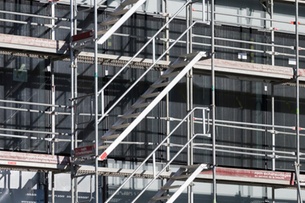The workers were sub-contracted and received about a third of a proper wage. (Keystone) - Click to enlarge A labour court in Geneva has ruled against a Polish subcontractor that underpaid its seconded employees working on a Geneva building site. The workers were earning €8 an hour, about a third of what the work warranted, the court said. The case has been ongoing for almost five years and was led by the UNIA trade union on behalf of the workers. However, despite its satisfaction at Monday’s ruling, much work remains to be done, including to recover the unpaid salaries, it said. + More on the current debates around immigrant workers in Switzerland The reason for the delay and difficulty of the case is simply that
Topics:
Swissinfo considers the following as important: Featured, newslettersent, Swiss Markets and News, Work
This could be interesting, too:
Nachrichten Ticker - www.finanzen.ch writes Die Performance der Kryptowährungen in KW 9: Das hat sich bei Bitcoin, Ether & Co. getan
Nachrichten Ticker - www.finanzen.ch writes Wer verbirgt sich hinter der Ethereum-Technologie?
Marc Chandler writes March 2025 Monthly
Mark Thornton writes Is Amazon a Union-Busting Leviathan?

The workers were sub-contracted and received about a third of a proper wage. (Keystone) - Click to enlarge
A labour court in Geneva has ruled against a Polish subcontractor that underpaid its seconded employees working on a Geneva building site. The workers were earning €8 an hour, about a third of what the work warranted, the court said.
The case has been ongoing for almost five years and was led by the UNIA trade union on behalf of the workers. However, despite its satisfaction at Monday’s ruling, much work remains to be done, including to recover the unpaid salaries, it said.
+ More on the current debates around immigrant workers in Switzerland
The reason for the delay and difficulty of the case is simply that the Polish sub-contractor seems not to exist, or at least cannot be contacted. It is a type of “phantom-company” impossible to pin down, said one of the lawyers at a press conference.
The Polish company was sub-contracted by a German firm who were the principal contractors for the building work; however, according to Swiss law covering seconded workers, the primary company can only be prosecuted once all avenues of chasing down the sub-contractor are exhausted.
In this case, UNIA explained, the workers would need to obtain a court order from the Polish justice system before returning and possibly launching a case in Germany.
Carlo Sommaruga, a social democrat politician also active with UNIA, said today that he would launch a parliamentary initiative to try to change the rules and allow for immediate prosecution of the principal contracting company; however, he said, he was not confident of its success.
The trade union took pains to commend the reaction of Geneva University Hospitals, who had contracted the project out; despite having no legal obligations, it stepped in to pay up to 75% of the unpaid salaries.
Tags: Featured,newslettersent,Work
